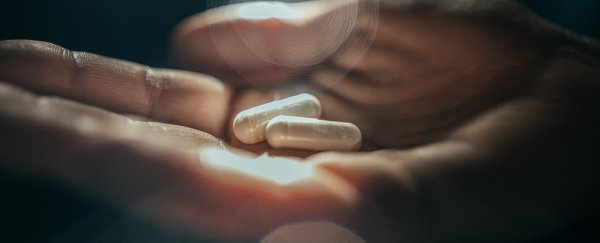For millions of people around the world, salvation from long periods of dark thoughts and oppressive feelings comes in pill form, with each dose doing its bit to ensure the balance of a humble neurotransmitter called serotonin remains relatively in check.
In spite of their popularity as a treatment for mood disorders, much of the mechanisms behind antidepressant pharmaceuticals are a complete black box. We can only guess at how they work in treating low moods.
More shocking still, those guesses could be completely wrong, throwing into question whether depression is in fact caused by a significant drop in serotonin at all.
A new umbrella review of past meta-studies and systematic analyses of depression's relationship with serotonin levels has come to the conclusion that there simply isn't sufficient evidence to support a link between the two variables.
This doesn't necessarily mean serotonin-based treatments aren't working on some other mechanism we don't yet understand. And no one should consider ditching their meds without consulting their doctors. But given so many people are relying on these drugs, it is important to figure out what's really going on.
"It is always difficult to prove a negative," says lead author Joanna Moncrieff, a psychiatrist from University College London.
"But I think we can safely say that after a vast amount of research conducted over several decades, there is no convincing evidence that depression is caused by serotonin abnormalities, particularly by lower levels or reduced activity of serotonin."
The origins of speculations that mood disorders arise from a chemical imbalance in the brain can be traced back further, to the mid-20th century, when a monoamine neurotransmitter called noradrenaline was proposed to be out of whack in people with depression.
Serotonin – that other famous monoamine – was also viewed with suspicion, leading to what became the monoamine hypothesis.
With selective serotonin reuptake inhibitor (SSRI) antidepressants entering the market in the 1980s, the notion that depression is a relatively straightforward deficit in some kind of neurological happy juice was primed for popularity.
"The popularity of the 'chemical imbalance' theory of depression has coincided with a huge increase in the use of antidepressants," says Moncrieff.
"Prescriptions for antidepressants have risen dramatically since the 1990s, with one in six adults in England and two percent of teenagers now being prescribed an antidepressant in a given year."
It's not hard to see why the hypothesis is accepted so whole-heartedly as fact. It's a simple problem with a simple fix, one that can be sold for a profit.
Marketing and commercial rewards aside, roughly one out of every five people with depression personally really do seem to experience relief in their symptoms while on antidepressants.
The idea is now so embedded in our public psyche, some 80 percent of the general public accepts depression is a chemical imbalance.
If you're among those who are hearing all of this for the first time, the hypothesis has been on shaky ground practically since it took off in the 1990s, with study after study failing to support the idea.
Aware there could be enough studies to keep the hypothesis alive, Moncrieff and her team searched through prominent research archives like PubMed and PsycINFO using terms relevant to meta-analysis investigations on depression and serotonin, excluding those associated with conditions linked with other conditions such as bipolar.
Independent reviewers assessed the quality of studies using broadly accepted research standards, before providing a final calculation of each study's level of certainty.
Just 17 studies made the cut, which included a genetic association study, another umbrella review, and a dozen systematic reviews and meta-analyses.
In all, the evidence supporting serotonin's role in depression was weak at best. Comparisons between levels of serotonin (and its breakdown products in the blood) in those with and without depression found no difference. Neither did huge studies comparing the genetics of serotonin and its supporting proteins.
Studies that looked directly at the behavior of the neurotransmitter's receptors and its transporter were a little more supportive of serotonin's role, but tended to be inconsistent in their findings, leaving open conflating explanations.
Looking closely at individuals who successfully take antidepressants, it does seem that they might have lower levels of serotonin. On the other hand, this might be expected over time as the body compensates for changes in biochemistry.
So where does that leave us?
Studies like these serve as a good reminder that differences in our body's functions can rarely be distilled down to a simple deficit. Depression is a complex condition, potentially arising from a variety of contributing factors (only some of which we as individuals have a lot of control over).
"Our view is that patients should not be told that depression is caused by low serotonin or by a chemical imbalance, and they should not be led to believe that antidepressants work by targeting these unproven abnormalities," says Moncrieff.
Critiques of the review point out, however, that many of the included studies did not use direct measures of serotonin activity in the brain, something we're only recently technologically capable of doing. So, more research is needed to determine how much is placebo and how much is down to some other weird tangle of neurochemistry.
It also means we need to have honest conversations about just how blind we are to the nature of chronic depression and the question-marks that persist over the true costs and benefits of antidepressants.
This research was published in Molecular Psychiatry.
